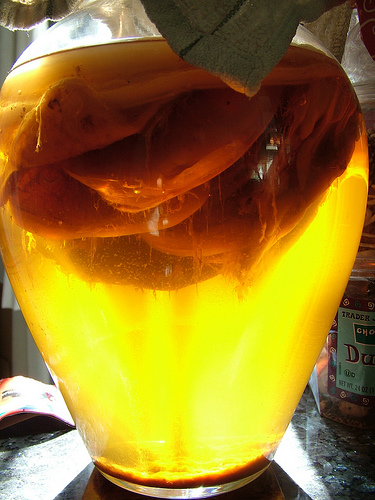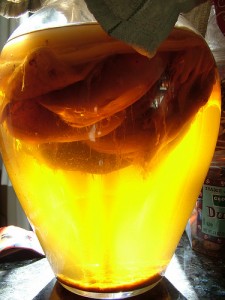
 The latest “miracle cure” in the fight against cancer seems to be Kombucha tea. And boy are the claims fantastic, anywhere from lowering cholesterol to improving the appearance of skin to coloring hair to helping with menstrual problems to relieving migraines to curing and preventing cancer. Is any of this true?
The latest “miracle cure” in the fight against cancer seems to be Kombucha tea. And boy are the claims fantastic, anywhere from lowering cholesterol to improving the appearance of skin to coloring hair to helping with menstrual problems to relieving migraines to curing and preventing cancer. Is any of this true?
In a nutshell, Kombucha tea is much like any other tea-it has some health benefits, but it’s no cure-all, and if used extensively, it can actually be dangerous.
The tea is made from what many refer to as a mushroom, but which isn’t technically a mushroom-instead, it’s a colony of bacteria and yeast that is said to resemble a pancake. To prepare it, you take a starter sample from an existing culture and grow a new one in a fresh jar. You then add this “mushroom” to sugar and black or green tea and allow it to ferment. When it’s finished, you have a liquid that contains a number of chemical compounds, including B vitamins and several acids like acetic, butyric, glucuronic, lactic, malic, and more.
At this time, there has not been a single human trial reported in a major medical journal that details any health benefits from drinking Kombucha tea. This doesn’t mean there aren’t health benefits-in fact, some old studies (performed between 1940–1960) reported some benefits on intestinal health, wound healing, and cholesterol levels. Even then, however, one Russian researcher warned that the possibility of any anti-cancer action lacked any foundation from a scientific-medical point of view.
The interest in Kombucha as an anti-cancer agent stems mostly from its perceived ability to help detoxify the body. Researchers have hypothesized that one of the acids in the tea may assist the liver in cleaning toxic waste, thereby making it more difficult for cancer cells to take hold. However, this is all speculation at this point as no studies have confirmed or denied such a possibility.
Meanwhile, if you’re considering adding Kombucha to your diet, it pays to employ a few safeguards. Cleanliness is especially important, as during fermentation you run the risk of growing unwanted contaminants that can later make you sick. People with compromised immune systems, especially, need to be overly cautious and ensure all utensils and containers are free of germs and that the proper temperature and pH levels are maintained.
Even if you’re buying the tea from a health food store, again be extra careful if you are fighting an illness. (Check out this post for more information.) Next, realize that there have been some reports of Kombucha causing stomach upset and allergic reactions, most likely because of the bacteria and yeast. Finally, the American Cancer Society reports on a couple cases of severe life-threatening reactions in people consuming a lot of the tea, specifically severe “acidosis”-an abnormal increase in acid levels in bodily fluids. No direct link to Kombucha tea was proven, but the drink is highly acidic and the FDA warned consumers to use caution. Because of this high acidity, the liquid can also leach lead from ceramic containers, so consumers are warned not to use ceramic pots for brewing.
If you or a loved one is facing cancer, determining what to use in the battle for your health is a very personal decision. Just be sure you use your head as well as your heart, do your research, and realize that those peddling Kombucha as the next miracle cure are more interested in your wallet than your health. (The Mayo Clinic recommends that until we have more studies, it’s best to avoid using the drink.) Remember too that over the years, we’ve seen miracle cures come and go. If they really worked, wouldn’t we all be cancer free by now?
What do you think about Kombucha tea? Please share.
Photo courtesy Tarek Maassarani via Flickr.com.

